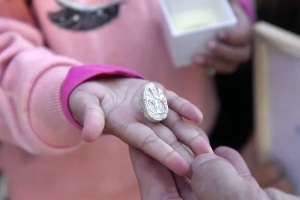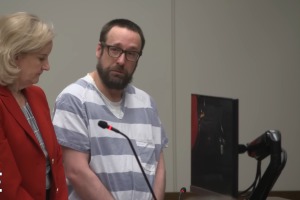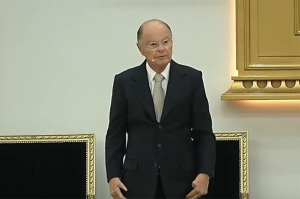Pope Francis' Message for Washington
"Preach the Gospel at all times, and if necessary, use words" is a quote widely attributed to St. Francis of Assisi. It also seems to be the motto of Pope Francis. Instead of just talking about abstract doctrines, he consistently lives out his beliefs in public ways that have grabbed the world's attention. His example of humility, compassion, and authenticity resonate powerfully in Washington, where cynicism is rampant, pride remains even after the proverbial falls, and an ideology of extreme individualism has overtaken a significant faction within our politics.
The Pope's words and deeds fascinate us because they are genuine and selfless. How could a leader of global significance spend time cold calling pregnant women in distress, kissing the feet of young Muslim inmates, or embracing a disfigured man? What sorts of values motivate such behavior? These stories touched our hearts, but they appeared irrelevant to our politics.
Then the Pope started talking about our wallets, which, according to a several commentators on the far right, instantly transformed him into a threat to capitalism itself.
His appropriately named, Joy of the Gospel, caused a stir when he asked questions like, "How can it be that it is not a news item when an elderly homeless person dies of exposure, but it is news when the stock market loses two points?" He had the audacity to say, "Some people continue to defend trickle-down theories which assume that economic growth, encouraged by a free market, will inevitably succeed in bringing about greater justice and inclusiveness in the world. This opinion, which has never been confirmed by the facts, expresses a crude and naïve trust in the goodness of those wielding economic power and in the sacralized workings of the prevailing economic system. Meanwhile, the excluded are still waiting."
More reasonable pundits from across the political spectrum understand the value of the Pontiff's challenge to "the idolatry of money and the dictatorship of an impersonal economy lacking a truly human purpose." Conservative columnist Michael Gerson, who calls himself a "defender of market economics," wrote "Absent a moral commitment to human dignity, justice and compassion, capitalism is conducive to materialism, individualism and selfishness. It is a system that depends on virtues it does not create." These are the concerns Pope Francis has and the values he is lifting up.
As an evangelical whose work has focused on the intersection of faith and public life, let me offer two additional reflections that will render Pope Francis more understandable to our public life.
First, the Pope is simply being a Christian. While economists focus on the theoretical debates and politicians engage in legislative battles, the "Vicar of Christ," who leads 1.2 billion Catholics, is following Jesus' call to love God and serve our neighbors (Mark 12:30-31). Faithfulness is not found by adhering to a partisan agenda or an economic ideology. As Pope Francis recently noted, it requires going to the margins of society and becoming "acquainted with the reality and life-experiences of people." If we don't, Francis says, "we then run the risk of being abstract ideologists or fundamentalists, which is not healthy." The Pope has called all priests to leave their comfort zones by focusing on the poor. Our elected leaders should do the same. Second, the Pope's views are in line with the historical teaching of the Catholic Church. Commenting on the uproar caused by his statements on economics, "There is nothing in [the statement] that cannot be found in the social Doctrine of the Church." Indeed, back in 2009 Pope Benedict said very similar things:
"Economy and finance, as instruments, can be used badly when those at the helm are motivated by purely selfish ends. Instruments that are good in themselves can thereby be transformed into harmful ones. But it is man's darkened reason that produces these consequences, not the instrument per se. Therefore it is not the instrument that must be called to account, but individuals, their moral conscience and their personal and social responsibility. Economic life undoubtedly requires contracts, in order to regulate relations of exchange between goods of equivalent value. But it also needs just laws and forms of redistribution governed by politics, and what is more, it needs works redolent of the spirit of gift."
There are many lessons that all of us-and especially our elected leaders--can learn from Pope Francis. Public trust is gained when leaders serve others with humility. We must examine ourselves before judging others. Our deepest values should transcend narrow political labels.
But above all we should recognize that this Pope is a refreshing expression of a moral authenticity and selflessness that is lacking in a political culture dominated by habitual cynicism and calculated self-interest. Francis is a savvy yet simple leader echoing a basic message: Love God, Serve Neighbor.





























